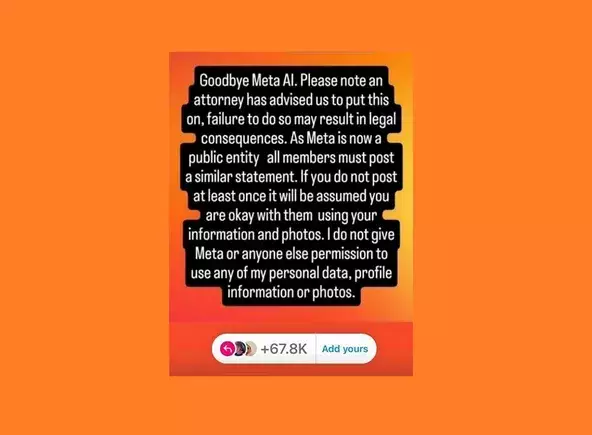In an era characterized by instant communication and social media dominance, the quest for knowledge and understanding often gets overshadowed by a desire for quick gratification. Many social media users eagerly share posts that promise a semblance of control over their online data, particularly in the face of powerful tech giants like Meta. However, the shared belief that these posts can effectuate real legal change is nothing more than an illusion. The culture of sharing vague legal disclaimers on platforms like Instagram or Facebook has become a widespread phenomenon, but it is essential to differentiate between performative acts and genuine understanding of legal frameworks.
The fervent sharing of posts that claim to protect users from corporate misuse of their data is akin to performing a ritualistic dance without understanding its significance. Users express outrage, panic, or even compliance, while failing to grasp the underlying principles of the agreements they consent to the moment they sign up for a service. Ironically, this widespread ignorance coexists with unprecedented access to information. The devices used to propagate misleading legal narratives are also gateways to platforms containing a wealth of educational resources that could foster genuine understanding.
The Realities of Data Ownership
One of the core issues lies in the misunderstanding surrounding data ownership and consent. The concept often revolves around the legal agreements presented by companies like Meta, which users routinely accept without thorough examination. Contrary to popular belief, simply posting a disclaimer does not alter the specifics of the user agreement, nor does it serve as a valid objection to how a company utilizes user-generated content.
For instance, Meta’s own statements clarify that while it honors the privacy of direct messages, publicly shared content is fair game for AI training. This leads to a regrettable conclusion: by participating in social platforms, users have tacitly consented to the terms laid out in these poorly understood agreements. Thus, the ideal of using social media as a shield against corporate exploitation crumbles under the weight of legal reality. Instead of opting for performative gestures, individuals would benefit from taking the time to read and comprehend the terms they agree to.
Celebrity Influence and Misinformation
Another contributing factor to this trend is the role of influencers and celebrities in shaping the narratives that circulate online. When well-known figures like Rafael Nadal propagate legal disclaimers, followers are likely to assume credibility simply because of their fame. This creates a dangerous feedback loop where misinformation is popularized, leading to collective misconceptions regarding rights and protections available to users.
The shared outrage becomes less a precursor to meaningful discourse and more an echo chamber where ignorance thrives. This phenomenon highlights the obligation of not only individuals to inform themselves but also the responsibility of influencers to promote factual information rather than viral, attention-grabbing posts.
Given the inadequate nature of social media activism, what should consumers do instead? First and foremost, users are encouraged to seek information directly from credible sources. It is essential to read and understand user agreements, legal rights, and privacy policies associated with various platforms. For those in the European Union, learning about the “Right to Object” can provide avenues for taking action against unwanted data usage.
Moreover, empowering yourself with knowledge transcends the individual. It is imperative to support political candidates and organizations that advocate for consumer rights and data privacy. While social media offers immediacy, the nuances of political and legal matters demand thorough engagement that can’t be distilled into 280 characters or an Instagram story.
Ultimately, the culture of rapid sharing must give way to a more judicious approach to information consumption. Social media is designed for brevity and engagement; however, critical thinking should not be left behind. Complex political and legal issues deserve careful thought, discussion, and, most importantly, understanding.
While sharing captivating posts may provide a fleeting sense of empowerment, it is imperative that users cultivate genuine knowledge about their rights and the platforms they engage with. It’s time for individuals to step beyond the realm of social media theatrics and embrace a more informed, proactive approach to navigating the intricate landscape of digital rights and corporate responsibility.


Leave a Reply
You must be logged in to post a comment.